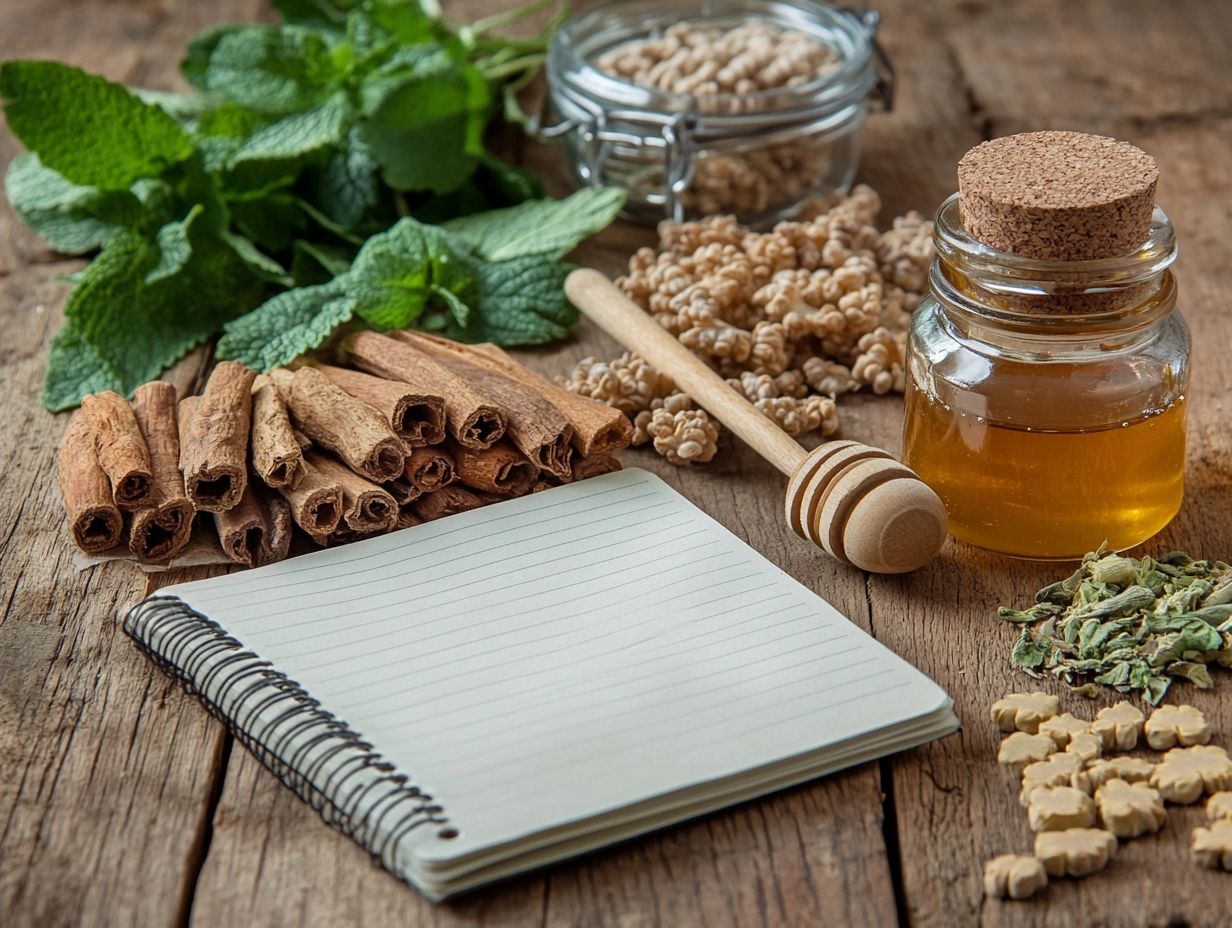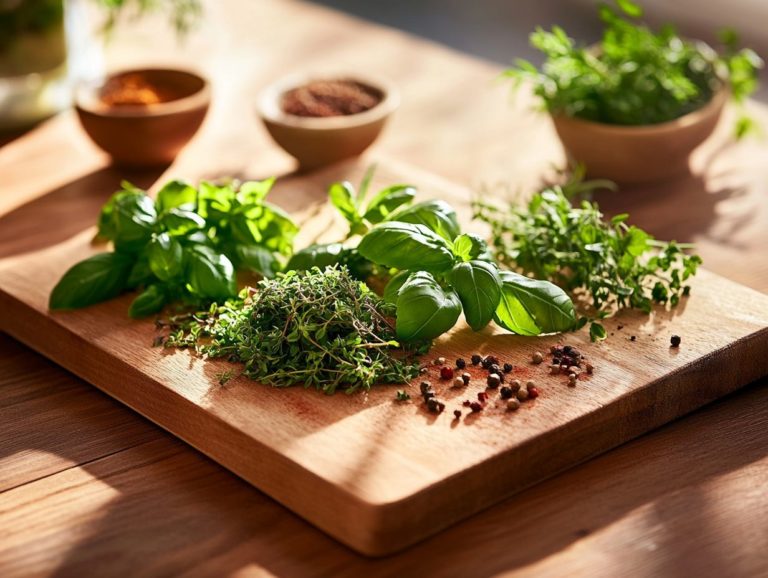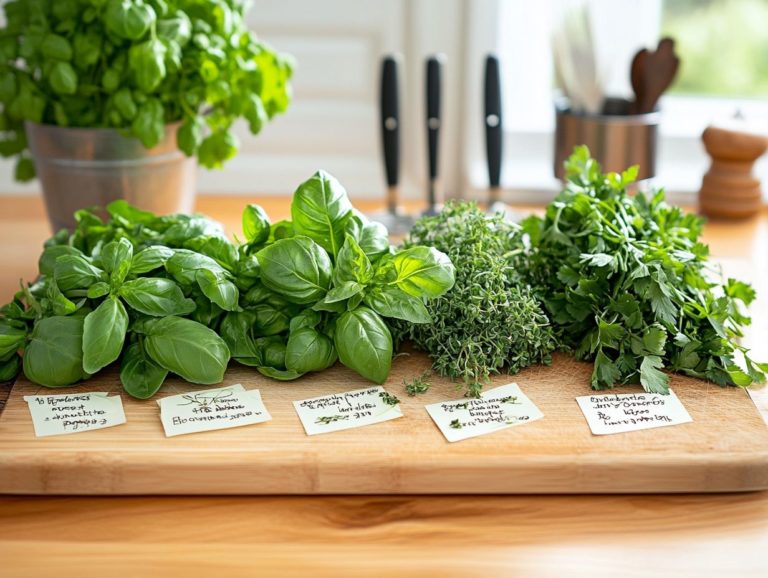Herbs for Diabetes Management: A Guide
Diabetes is a growing concern for millions worldwide. Many are exploring natural solutions alongside traditional treatments.
This article looks at the role of herbs in managing diabetes. It showcases their potential benefits and applications.
Discover the common herbs that can boost your health. We’ll also share tips for incorporating them into your daily routine and essential precautions to consider.
Whether you want to enhance your current management plan or are curious about herbal remedies, this guide offers valuable insights.
Contents
- Key Takeaways:
- Common Herbs for Diabetes Management
- How to Incorporate Herbs into Your Diabetes Management Plan
- Potential Risks and Interactions
- Frequently Asked Questions
- What are some herbs that can help manage diabetes?
- How do these herbs work to manage diabetes?
- Are there any side effects of using herbs for diabetes management?
- Can herbs be used as a replacement for diabetes medication?
- How should herbs be consumed for diabetes management?
- Are there any other lifestyle changes that should be made when using herbs for diabetes management?
Key Takeaways:

What is Diabetes?
Diabetes is a condition that affects how your body processes sugar. It leads to high blood sugar levels, which can be dangerous.
This happens because your body either doesn’t produce enough insulin or can’t use it properly. Serious complications can arise, including heart disease, nerve damage, and kidney problems.
The two main types are:
- Type 1 diabetes: Your body cannot produce insulin.
- Type 2 diabetes: Your body struggles to use insulin effectively, often linked to lifestyle choices.
Common symptoms include increased thirst, frequent urination, fatigue, and blurred vision.
Type 1 diabetes usually appears in childhood or early adulthood and is often an autoimmune disorder. Type 2 diabetes is more common in adults and can often be managed with lifestyle changes like diet and exercise.
Early diagnosis is crucial to prevent complications. By understanding the causes, such as genetics or obesity, you can actively participate in your treatment journey.
How Can Herbs Help?
Herbs can significantly aid your diabetes management. They offer natural remedies that complement traditional treatments.
These herbs may help regulate blood sugar levels and improve your overall health. Collaborating with your healthcare team ensures you’re on the right path.
Several herbs have promising benefits, including:
- bitter melon
- fenugreek
- cinnamon
Integrating these herbs into your diabetes diet can assist in blood sugar control and add nutrients to your meals. Always discuss these options with your healthcare team to align them with your treatment plan.
Common Herbs for Diabetes Management
Several herbs are gaining attention for their potential benefits in diabetes management.
Cinnamon, bitter melon, aloe vera, and ginger are among the most popular options. Other herbs like Gymnema sylvestre and fenugreek are also being researched.
These natural remedies may help regulate blood sugar levels and improve your overall wellness.
Benefits and Uses of Each Herb

Each herb you incorporate into your diabetes management plan brings its own unique benefits. Take cinnamon, for instance; it s celebrated for enhancing insulin sensitivity.
Then there s bitter melon, which may assist in lowering blood sugar levels. Aloe vera has been recognized for its potential to reduce A1C levels, making these herbs invaluable additions to your diabetes diet.
Consider gymnema sylvestre, which has been traditionally used to curb sugar cravings. This makes it easier for you to stick to dietary recommendations.
Scientific studies back gymnema’s ability to help lower blood sugar levels and improve how well your body manages blood sugar levels.
Fenugreek seeds, with their rich soluble fiber content, not only aid digestion but also promote better metabolic health.
These herbs do more than just complement a diabetes diet; they create a powerful approach that boosts your overall health. By incorporating these natural remedies, you create a synergy between mindful eating and traditional practices, ultimately enabling yourself to manage your condition more effectively.
How to Incorporate Herbs into Your Diabetes Management Plan
Incorporating herbs into your diabetes management plan requires a deliberate approach that harmonizes with a healthy lifestyle.
Work with your healthcare team to find the best herbal products and strategies tailored to your unique health needs and goals.
This thoughtful integration can significantly enhance your glucose control and contribute to your overall wellness.
Tips for Safe and Effective Use
To ensure the safe and effective use of herbal products in managing diabetes, consult with healthcare professionals and stick to the recommended dosages. Regularly monitor your blood sugar levels, as some herbs might interact with your diabetes medications or lead to unexpected side effects.
Keeping a detailed record of your herbal intake and any changes in your symptoms can be invaluable in evaluating the effectiveness of the remedies you choose.
It’s also essential to thoroughly research various herbs. While some may have a historical reputation for managing diabetes, the scientific evidence regarding their efficacy and safety can differ significantly.
Always take potential allergies and sensitivities into account. Discuss any new herbal supplements with your healthcare provider before incorporating them into your regimen. This proactive communication fosters a collaborative approach to managing diabetes safely.
Potential Risks and Interactions
While herbs may present potential benefits for managing diabetes, it’s crucial to recognize the inherent risks and interactions, particularly when used alongside diabetes medications.
Therefore, seeking guidance from healthcare professionals is essential to mitigate any adverse effects and to ensure that your treatment plan is both safe and effective.
Possible Side Effects and Precautions

Understanding the possible side effects and precautions associated with using herbs for diabetes management is crucial for a safe approach. Certain herbs may lead to adverse reactions or complicate existing health conditions, which underscores the importance of collaborating with your healthcare team.
Herbs like ginseng, fenugreek, and bitter melon can offer potential benefits, but they also come with risks that shouldn’t be brushed aside.
You might encounter gastrointestinal issues, allergic reactions, or even interference with your prescribed medications. It’s essential to discuss these factors with your healthcare provider before adding any new herbal remedies to your routine.
If you have conditions like kidney disease or are pregnant, extra caution is necessary. Regular check-ins and open dialogue with healthcare professionals can greatly enhance your safety, ensuring that any herbal regimen is specifically tailored to your health needs and monitored for effectiveness.
Frequently Asked Questions
Here are some common questions about using herbs for diabetes management.
What are some herbs that can help manage diabetes?
Some herbs that have been found to be beneficial for managing diabetes include cinnamon, fenugreek, ginger, bitter melon, and aloe vera.
How do these herbs work to manage diabetes?
Cinnamon, fenugreek, and ginger are amazing herbs that can help balance your blood sugar levels!
Bitter melon and aloe vera contain compounds that mimic insulin. These herbs can significantly improve glucose metabolism.
Are there any side effects of using herbs for diabetes management?

Herbs are generally safe to use. However, some may have side effects such as stomach upset.
Other potential issues include interactions with medications or allergic reactions. It is important to consult with a healthcare professional before using herbs for diabetes management.
Can herbs be used as a replacement for diabetes medication?
No, herbs should not be used as a replacement for medication prescribed by a doctor. They can be used as a complementary treatment, but it is important to continue taking prescribed medication and checking your blood sugar levels regularly to see how your body responds.
How should herbs be consumed for diabetes management?
You can enjoy herbs in many ways like in teas, supplements, or added to meals. It is important to follow proper dosages and guidelines for each specific herb.
Consult with a healthcare professional before use to ensure safety and effectiveness.
Are there any other lifestyle changes that should be made when using herbs for diabetes management?
Herbs are helpful for managing diabetes. It’s crucial to make other lifestyle changes too.
Consider maintaining a healthy diet, exercising regularly, and monitoring your blood sugar levels. These changes can work together with herbs to improve diabetes management.






